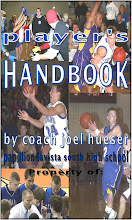Success in basketball is dependent upon 26 principles. These winning principles are fundamentally sound, simple to teach, easy to remember, and apply to any style of play or age group.
1. Protect the ball. Bad passes and low-percentage shots are the trademarks of a poor team.
2. Be careful on a lay-up. More games are won on lay-up shots than on any other, and more games are lost because of poor lay-up shots than by any other shot.
3. Basketball is a game in motion. Motion on the court is vital. Too many players stand still and beg for the ball. Players should always pass and move. This action will take their defenders away from the ball and open up the court for a teammate.
4. Always fake direction. Faking is important because it tricks opponents into making mistakes.
5. Move to meet the pass. Moving and meeting the pass is the stamp of a good ballplayer. Players who move and meet passes make it easy for teammates to get them the ball.
6. When in trouble, make a V-cut (i.e., "clear out"). A player in the wrong position on the floor should make a V-cut. This will open up the floor.
7. Don't think for the opponents -- be yourself. Play your game and do not spend time trying to figure out what your opponents are thinking.
8. One player cuts at a time. Always remember -- only one cutter at a time. Two players cutting at the same time allows the defense to be in a position to either double-team the ball or stop the play.
9. Grab it -- don't tap it. Effective rebounders grab and secure the ball rather than tapping it.
10. Never force a shot. Never shoot a shot if closely defended. Before attempting a shot, make sure that you have teammates in rebounding positions.
11. Dribbling is an emergency measure. Nine out of 10 players dribble or bounce the ball before they do anything else. This is a bad habit because it limits a player's opportunities.
12. Talk to your teammates. Talking on offense and defense builds team play. Talking encourages teammates. Talking on defense is vital when picking up loose opponents.
13. Never turn your head on defense. Players should never turn their heads to watch the ball when playing man-to-man defense. When players change from offense to defense, they should backpedal so that they can locate their personal opponent or help in case of a fast break.
14. Don't cross your feet on defense. Successful defensive players move their feet in short steps when playing defense.
15. Hands up on defense. Tight-rope walkers use their hands for defense, and the good defensive player does likewise. Movement of the hands and feet discourages passing and shooting and shows that the defensive player is on the ball.
16. Watch your opponent's belly-button. We like our defensive players to keep their eyes glued to a part of the offensive ball-player that can't fool them -- the belly-button.
17. Pick up the first man. When you are back or coming down the floor ahead of the rest of your teammates, pick up the first offensive player down the court, whether it's your assigned player or not.
18. Don't leave your feet on defense. Good defensive players keep their head up and their feet on the ground.
19. Get position for rebounds. Instinct and sensing the direction of the shot and the angle of the rebound enables players to move into the correct rebounding position.
20. If you can't rebound, you can't win. Good rebounding limits the opponents' shots and this is the key to winning basketball games.
21. The first fast-break pass must be perfect. The fast break must get started with a quick outlet pass. If the first pass is a good one, the fast break is underway. After it's started, it's hard to stop.
22. You must make 70 percent of your free throws. There is no excuse for being a poor free-throw shooter. Practice, confidence, and the proper technique are the keys.
23. Keep the defense busy. If all five offensive players keep moving, their opponents cannot afford to sag or float. Moving with or without the ball forces the defense into making mistakes.
24. Don't cross the backboard to shoot. A player should learn to shoot from both sides of the basket and with both hands.
25. Never underrate an opponent. Be ready to play every game. Overconfidence can affect a team's play. It is wise to remember that it is only the underdog who can do the upsetting.
26. Practice does not always make perfect -- if you practice the wrong thing. Players often work long and hard and make little progress because they are practicing incorrectly.
By Alvin Julian
Hall of Fame coach Alvin "Doggie" Julian led Holy Cross to the 1947 NCAA Championship.
During his 41-year coaching career, he also coached the Celtics and at Dartmouth, where he won three Ivy League titles.
Brewers Standard
5 months ago


No comments:
Post a Comment